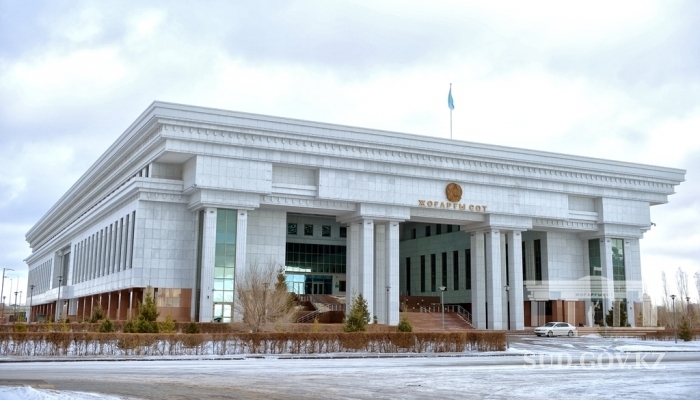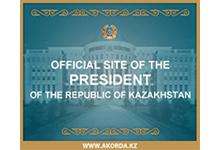Mon, 02/13/2017 - 12:32
Temirtau city court of Karaganda region applied to the Constitutional Council with a presentation on the verification of the constitutionality of the Rules for issuing documents for leaving the Republic of Kazakhstan for permanent residence, approved by Government Decree No. 361 dated March 28, 2012 (Rules).
The Constitutional Council, having considered the presentation of the court, established the following.
In the proceedings of the court there is a civil case on B. legal claim to M. about the permission of the plaintiff to leave for permanent residence in the Russian Federation. The reason for applying to the court was the refusal of M. - father B. - to give her written permission to leave. In this connection, B. asks the court to allow her to leave for permanent residence in the Russian Federation.
Having examined the materials of the civil case, and having heard the plaintiff explanations, the court found the infringement of the rights of a person and citizen enshrined in the Constitution in connection with the contradiction of subparagraph 3) of paragraph 7 of the Rules of Article 21, paragraph 2, and Article 39, paragraph 1, of the Constitution. In this regard, the court, in accordance with Article 78 of the Constitution, suspended proceedings in a civil case and appealed to the Constitutional Council with the above presentation.
Having analyzed the norms of the Constitution in relation to the subject of the appeal, the Constitutional Council supposes that the establishment by the Government in the Rules of the norm on the need to obtain consent to leave certain categories of citizens, if understood in accordance with the meaning of Articles 12 and 34 of the Constitution, is aimed at enforcing the provisions of the Law and the Marriage Code (Matrimony) and family (MCF) of the obligations of the departing person and, therefore, does not contradict the Basic Law.
However, the Constitutional Council considered that in the Law dated 22 July, 2011 № 477-IV «On population migration" (the Law), Rules, Standards of public services "Drawing up the documents to travel outside the Republic of Kazakhstan for permanent residence", approved by the Order of the Minister of Internal Affairs RK dated 19March, 2015 № 254 (Standard) and the Regulations of the state service " Drawing up the documents to travel outside the Republic of Kazakhstan for permanent residence", approved by Order of the Minister of Internal Affairs of the Republic of Kazakhstan dated 30 May, 2015 № 498 ( Regulation) contains provisions allowing more than their interpretation and creates legal uncertainty.
These Rules determine the procedure for the departure of citizens of the Republic of Kazakhstan from the Republic of Kazakhstan to a permanent place of residence. However, the conditions and procedure for leaving for permanent residence are fixed, as required by the Constitution, by Article 55 of the Law.
The requirements of Article 56 of the Law are not implemented in the Rules, the Standard and the Regulations: "In all cases of restriction of the right to leave the Republic of Kazakhstan for permanent residence, the internal affairs authorities shall issue a notification to the citizen of the Republic of Kazakhstan stating the reason and term of the restriction and the procedure for appealing against this decision" .
The initial principles are unclear when determining the differences in the lists of documents required for citizens of the republic located in Kazakhstan and citizens of the republic temporarily moving out of the country and subsequently expressing a desire to stay there for permanent residence, who apply to the overseas institutions of the Republic of Kazakhstan. For this category of citizens, it is not necessary to submit all the documents specified in clause 7 of the Rules. The legal consequence of this is the inequality of citizens leaving for permanent residence and the varying degree of protection of the rights of persons for whom there are unfulfilled obligations for travelers.
The Constitutional Council shared the Government's position that the provisions of subparagraph 3) of paragraph 7 of the Rules based on the norms of the CMF should protect certain categories of citizens. However, in the above edition, the Rules change the content of regulated relations from legally defined to legally vague. The Law (subparagraphs 4) and 7) of Article 56) precisely specifies the subjects who are temporarily refused to leave the country, the documentary grounds and the time limits for this right.
In the Rules, however, the list of subject-alimony recipients is left open, it indicates not only those subjects who have legally registered alimony obligations, but also persons who have the potential right to alimony. The role and significance of the requirement to submit a "notarized application" is not limited to the documentary side of the exit registration. It imposes on the traveler an additional obligation to independently search for potential alimony recipients, even under conditions where the related persons were not supported by the said persons, or these persons are not known to him. But depending on the performance of this duty, a decision will be made to satisfy the application for departure or to refuse.
In this case, the initiative to apply to the court belongs to the interested person, both entitled to alimony, and their payer. The debtor is temporarily refused to leave the republic for permanent residence until the fulfillment of his obligations established by the MCF.
In the opinion of the Constitutional Council, the Law and the MCF fix a balanced ratio of freedom and responsibility in securing the constitutional rights of those leaving for a permanent place of residence outside the Republic of Kazakhstan and those remaining in the country who need support on the part of the departing. The imposition on a traveling person of the obligation to submit a notarized application from residents residing in the Republic of Kazakhstan who are legally entitled to receive from leaving alimony, about their absence of objections to leave, actually translates the civil dispute over maintenance obligations into the constitutional and legal sphere on the prohibition person to exercise the right established by paragraph 2 of Article 21 of the Constitution.
Meanwhile, subparagraph 3) of paragraph 7 of the Rules in the part "Where an applicant for any reason cannot receive such a statement, the issue is resolved in court" is characterized by considerable legal uncertainty that generates discrepancies in the subject of claims and the specifics of the process Consideration of claims. The study by the Supreme Court of cases of this category showed that citizens who are often intending to leave for the territory of the Republic of Kazakhstan are forced to apply to the court even in cases when a person from whom it is necessary to obtain a notarized statement that there are no objections to departure lives outside Kazakhstan . That is, in conditions where there is virtually no legal dispute, which creates significant obstacles to the exercise of the constitutional right to leave.
The Constitutional Council shared the position of the Supreme Court that a preventive judicial verification mechanism - a statement in the court's decision that there are no legal obstacles to leave - may serve as the basis for a positive decision by the migration police.
The Constitutional Council decided to recognize subparagraph 3) of paragraph 7 of the Rules in accordance with the Constitution. At the same time, the Government is recommended to bring the Rules in line with the legal positions of the Constitutional Council contained in this regulatory decision, and also consider initiating amendments to the legislative acts regulating public relations in the field of population migration with a view to better ensuring human rights and freedoms and citizen.
Related materials
- In Almaty, judges discussed the matters of criminal prosecution and judicial consideration of cases of terrorist crimes and other transnational nature
- The jurisprudence of Kazakhstan on the application of the Aarhus Convention will be recommended to the countries-participants of the Convention
- Dear readers!


